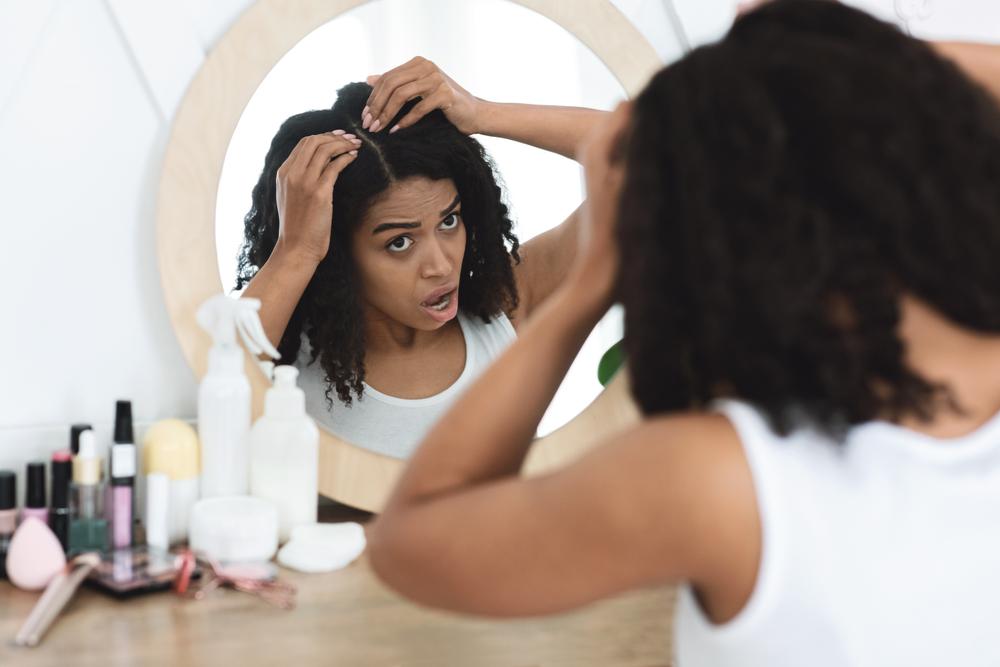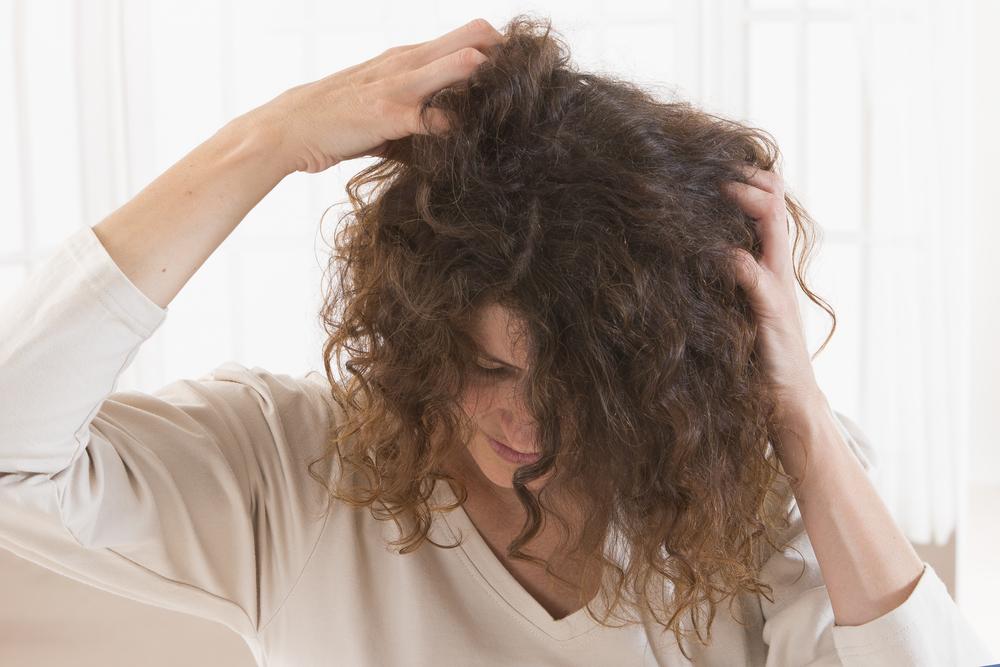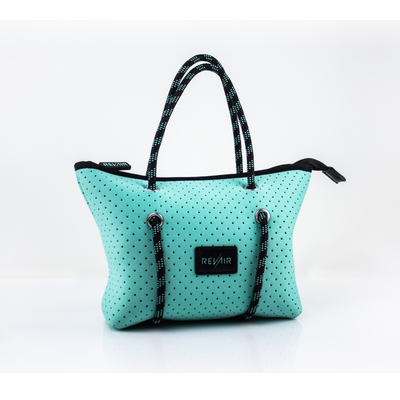
Tips to Combat Itchy, Dry Scalp This Winter

There's a lot to love about winter. From lights and tinsel to food and festivities, tis the season for gathering with family and friends, cozying up by the fireside, and taking time back from your normal busy schedule to reflect, recharge, and refresh. Of course, it can be difficult to enjoy the moment when scalp irritation has you feeling less merry and bright and more itchy and uncomfortable, not to mention frustrated with your winter hair care routine.
If there's one thing we don't love about winter it's the toll cold weather takes on our hair. From Type 1 and Type 2 hair that tends to be smooth, straight, and sleek, to Type 3 and Type 4 hair that falls more on the wavy and coily side of the hair spectrum - no hair type or texture is safe from frizz, flaking, and flatness. Winter hair might look a bit different depending on your hair type, but a dry scalp is a common culprit behind seasonal hair woes.
So what exactly causes dry scalp and how can we combat dry scalp in the wintertime?
Scalp care is a lot like skincare. When the humidity level drops, it's time to up your beauty routine. Cold and dry air causes the water in your skin to evaporate rapidly. The evaporation process tightens the skin which in turn causes flaking and itching (think "alligator skin"). this makes your skin feel dry and tight, and makes it look flaky. In fact, our skin loses more than 25 percent of its ability to hold moisture in the winter. Combine this with wind, hot water, and our daily heat styling routine and our scalp and hair can be anything but cozy during the colder months,
It's time to add a better scalp care routine to your personal gift list this winter. Combatting dry scalp doesn't need to disrupt your low-key winter routine. Give these time-saving scalp care tips a try and incorporate a few small changes to optimize hair and scalp health when your skin needs it the most.
Opt for Mild Hair Products
Sometimes what we don't do to our hair is just as important as what we add to our hair care routine. Gentle hair products are always a good choice for dry hair, especially in the wintertime.
Choose shampoo, conditioner, and styling products with gentle, non-drying ingredients. This may mean switching your at-home beauty routine depending on the season or finding all-natural, sulfate-free products that can take your hair from summer to winter and every season in between. The key ingredients to avoid are drying agents. That means sulfates, alcohol, parabens, and harsh additives that irritate the dry scalp. Fragrances can also cause an itchy scalp. It's best to go minimalist in the wintertime and opt for products that are fragrance-free with simple ingredients.
The best ingredients for dry scalp should mirror your favorite lotion. Think natural oils like avocado, jojoba, coconut, and argan, alongside vitamins and nutrients that support skin care such as vitamin E and Omega-3 fatty acids.
Minimize Heat to Combat Dry Scalp
Winter may seem like the perfect time to stay warm and cozy, but when it comes to caring for a dry scalp, heat is the number one irritant. Go low-heat this winter with revolutionary new styling tools designed to gently sculpt and smooth your hair rather than frying your already delicate ends. Worried that learning a whole new styling technique might be too much stress on you and your lovely locks? Try a reverse air hairdryer! RevAir's simple reverse air dryer is easy to use and fits right into your styling routine.
Avoid soaking your scalp in the shower. We know it can be tempting to enjoy a long, hot shower on a winter day, but your hair will thank you for rinsing with cold or lukewarm water. Many beauty gurus find investing in a good detachable shower head a must in the winter. This allows you to rinse your hair off without having to shiver through your shower routine.
If you're a fan of keeping your home nice and toasty as soon as the weather turns cold, consider getting a humidifier for your room. This will restore some of your scalp's moisture and prevent itchy scalp while you sleep.

Do a DIY Scalp Cleanse
Winter is the perfect time to cleanse away the stress of the past year and start your new year's hair journey refreshed. Incorporating a DIY scalp cleanse into your weekly routine is a great way to prevent itchy scalp. Apple cider vinegar is the PSL of the scalp and haircare world. When the leaves start to fall, that means it's time to stock up on this amazing, all-natural hair product.
An apple cider vinegar wash works in a variety of ways when it comes to hair and scalp care. The natural acidity of apple cider vinegar counteracts the alkaline quality characteristic of frizzy and flat hair so your lovely locks are anything but basic. This incredible product also possesses antimicrobial properties which can prevent fungal and bacterial infections of the scalp. Reducing scalp build-up is especially important to pay attention to if your hair has been in a protective style all summer.
Apple cider vinegar is also rich in vitamins B and C, as well as essential minerals to stimulate healthy blood circulation of the scalp and promote hair growth during the winter.
For an indulgent apple cider vinegar wash you can make at home, simply:
- Mix a couple of tablespoons of apple cider vinegar with water.
- After shampooing and conditioning, pour the mixture over your hair evenly, working into your scalp.
- Let it sit for a couple of minutes.
- Rinse it out.
Add a few drops of your favorite essential oil for a little aromatherapy and leave itchy scalp behind as you enter the new year.
Treat Dry Scalp With Nourishing Oils
Your scalp deserves the best year-round. Treat your follicles to a revitalizing scalp massage at least 2-3 times per week depending on your skin type. Dry scalp-prone beauties will want to aim for three times per week to maximize scalp health.
Scalp oil treatments can be purchased at your favorite hair, beauty, and wellness shop or blended at home for a DIY itchy scalp treatment. Try 4 teaspoons jojoba oil, 3 teaspoons rose-hip oil, or 4 drops lavender oil. Not only do these dry scalp soothers reduce flaking, calm inflammation, and support natural hair growth, but they smell great too! Think of scalp treatments as another way to treat yourself with extra care as we take time out for ourselves during the winter months.
Be sure to incorporate a scalp massage into your nourishing routine. Massaging the dry scalp helps clear away dead skin cells while supporting healthy blood circulation and oxygenation to the hair follicles. Simply put - a scalp oil and massage treatment is a quick, efficient way to revitalize your scalp at home. Many beauty gurus notice a difference in a matter of weeks after making time for this one easy dry scalp hack.

Stay Hydrated, Not Irritated
If you're like most of us on a wellness journey, chances are there are days when you may forget to look after yourself as attentively as you'd like. Forgetting to drink enough water in the wintertime is a common pitfall for many. Combatting dry scalp starts with proper hydration. Drinking more water in the winter is advisable as the extra hydration helps restore lost moisture, keep you energized, and, of course, keep your hair glowing and radiant for every holiday photo.
Aim to drink around 3 liters per day. Set a wellness goal of hitting your daily water intake. A water bottle with a clear liter marker can help you keep track of how much you're actually drinking. Try to avoid filling up on coffee and other caffeinated beverages. While a warm cup of coffee may sound perfect for a cold day, caffeinated beverages can dehydrate you rapidly. Be sure to drink a glass of water before brewing another pot.
If you do find that your scalp is a bit irritated, be patient with your skin while you're perfecting your winter scalp care routine. That means no scratching, over brushing, or over-washing! Avoid products like dry shampoo as these can further exacerbate flaky scalps. Dry scalp can certainly be a pain (literally) to deal with, but have faith in the process. Reach for itchy scalp remedies before giving in to the urge to scratch. Clarifying your dry scalp with salicylic acid and tea tree oil can provide fast relief when adjusting to a new routine.
There's so much to get excited about for the winter season. Don't let dry and itchy scalp hold you back. With a few simple wellness tips and dry scalp hacks, your winter health and beauty routine can help you stay on the hair goals nice list.
What's your favorite tip for giving your hair and scalp a little extra TLC in the wintertime? Let us know and keep enjoying your naturally gorgeous hair!
















